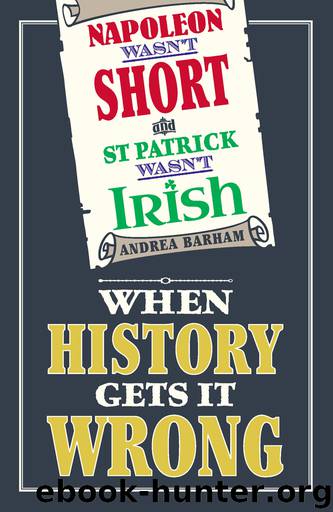Napoleon Wasn't Short and St Patrick Wasn't Irish by Andrea Barham

Author:Andrea Barham [Barham, Andrea]
Language: eng
Format: epub
Publisher: Michael O'Mara Books
Scottish explorer Dr Livingstone got lost in the Congo
In the popular imagination, Scottish missionary Dr David Livingstone has gained the reputation of being a rather feckless explorer, since many people believe that he got himself lost in darkest Africa for several years.
After visiting Africa as a missionary in 1841, Livingstone grew determined to explore the region. In an 1853 letter to fellow missionary Robert Moffat, he announced, ‘I shall open up a path into the interior, or perish.’ Livingstone set out on his Zambezi expedition, discovered Victoria Falls, named them after the queen, then became a national hero and best-selling author. In 1866, he set off on his final exploration to find the source of the Nile. Two years passed and nothing was heard from the popular adventurer.
James Gordon Bennett (the Gordon Bennett whose name obligingly stood in for ‘gorblimey’ in the late nineteenth century), who was editor of the New York Herald, hit upon the idea of sending one of his correspondents to search for Livingstone. Welsh-born, naturalized American Henry Morton Stanley (who began life in St Asaph workhouse in Wales) was given the job. In How I Found Livingstone in Central Africa, Stanley recalls Bennett telling him to ‘draw whatever sums of money were necessary for the prosecution of the search’. Stanley’s book, which was described by Florence Nightingale as ‘the very worst book on the very best subject I ever saw in my life’, reveals how, two years later in 1871, he tracked Livingstone down in the town of Ujiji, on the shores of Lake Tanganyika some time around 23 October (the exact date is uncertain).
Stanley tells how ‘as I advanced slowly towards him I noticed he was pale, that he looked wearied and wan’. He took off his hat and (apparently) said, ‘Dr Livingstone, I presume?’ (Alan Gallop explains in Mr Stanley, I Presume? that these famous words appeared in the New York Herald dispatch shortly after the meeting, but he adds that some historians have questioned whether Stanley actually uttered them, since the relevant page in his diary is missing and Livingstone’s own recollection of the meeting does not mention them.)
Livingstone replied, ‘“Yes”, . . . with a kind, cordial smile, lifting his cap slightly.’ Stanley follows this up with, ‘I thank God, Doctor, that I have been permitted to see you.’ Livingstone replied, ‘I feel thankful that I am here to welcome you.’ Stanley confirms that Livingstone ‘was not lost, just performing a marvellously thorough, detailed exploration’. He then informs us that ‘conversation began . . . What about? I declare I have forgotten.’ (I’m starting to see what Florence Nightingale means.)
D. Robert’s contribution to the Oxford Dictionary of National Biography reveals that the two men ‘travelled together to the north end of Lake Tanganyika and proved that it had no outlet there’, adding that ‘they parted on 14 March 1872 at Tabora, on the caravan route’. Despite Stanley’s suggestion that Livingstone return home, Roberts explains that the adventurer ‘resumed his quest’. Unfortunately, when Stanley returned to Britain with news that he had located Dr Livingstone, his claims were ridiculed.
Download
This site does not store any files on its server. We only index and link to content provided by other sites. Please contact the content providers to delete copyright contents if any and email us, we'll remove relevant links or contents immediately.
Periodization Training for Sports by Tudor Bompa(8271)
The Body: A Guide for Occupants by Bill Bryson(5096)
The MacArthur Bible Commentary by John MacArthur(4826)
The Sports Rules Book by Human Kinetics(4386)
What It Really Takes to Get Into Ivy League and Other Highly Selective Colleges by Hughes Chuck(3760)
Marijuana Grower's Handbook by Ed Rosenthal(3682)
The Sprouting Book by Ann Wigmore(3592)
The Martian by Andy Weir(3427)
Salt, Fat, Acid, Heat: Mastering the Elements of Good Cooking by Nosrat Samin(3147)
Harry Potter 4 - Harry Potter and The Goblet of Fire by J.K.Rowling(3073)
Sapiens and Homo Deus by Yuval Noah Harari(3071)
The Bread Bible by Rose Levy Beranbaum(3069)
The Marketing Plan Handbook: Develop Big-Picture Marketing Plans for Pennies on the Dollar by Robert W. Bly(3062)
Classic by Mary Berry(3012)
Martha Stewart's Baking Handbook by Martha Stewart(2860)
Screenplay: The Foundations of Screenwriting by Syd Field(2642)
The Plant Paradox by Dr. Steven R. Gundry M.D(2620)
50 Economics Classics by Tom Butler-Bowdon(2571)
The Cambridge Grammar Of The English Language by Rodney Huddleston Geoffrey K. Pullum(2430)
